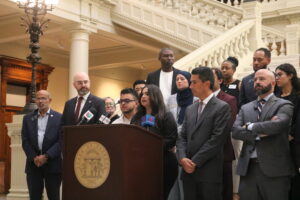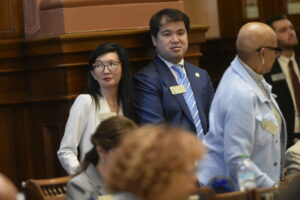The federal immigration case against a jailed, Spanish-language journalist has been bolstered by the help of a metro Atlanta sheriff’s office, public records show. Mario Guevara’s two-month confinement in immigration detention has drawn outcry from free press and immigration advocates.
Immigration officials’ primary objection to releasing Guevara on bond as he awaits the outcome of deportation proceedings, according to court records, is rooted in how he reports on law enforcement.
The revelation of the close coordination between the Gwinnett County Sheriff’s Office and U.S. Immigration and Customs Enforcement to keep Guevara in jail comes amid growing calls for him to be freed, and warnings that the Trump administration and local governments are trampling First Amendment rights.
A team of attorneys representing Guevara, including the ACLU of Georgia, filed a motion Wednesday in federal court for his immediate release. They argue that targeting Guevara for his work as a reporter is government censorship.
Journalist Mario Guevara pictured after two months in ICE custody. Guevara’s continued imprisonment has sparked outcry over the treatment of immigrants and the rights of journalists. Photo by Alondra Madrigal/MGNews
The filing also claims that because Guevara’s continued detention violates his First Amendment right to free speech, it also violates his right to not be “deprived of life, liberty or property without due process” under the Fifth Amendment. Guevara is a caretaker for his adult son, who suffered a stroke during surgery to remove a brain tumor in 2021. His family has also struggled financially since his arrest.
Guevara, who fled El Salvador in 2004 because his work as a journalist put him in harm’s way, has spent over two months in immigration detention, much of that time in solitary confinement, according to his attorneys, Zachary Gaeta and Giovanni Diaz. Immigration officials have moved Guevara repeatedly; he has been held in six different detention centers and jails since his arrest on June 14.
 Heavily armored police swarm a shopping center to disperse anti-Trump protesters at the demonstration in DeKalb County where reporter Mario Guevara was arrested. Ross Williams/Georgia Recorder
Heavily armored police swarm a shopping center to disperse anti-Trump protesters at the demonstration in DeKalb County where reporter Mario Guevara was arrested. Ross Williams/Georgia Recorder
Despite having valid authorization to work in the United States and being granted bond by an immigration judge on July 1, Guevara has remained in the custody of U.S. Immigration and Customs Enforcement. Guevara also has a path to a green card through his adult son.
Records obtained from the Gwinnett County Sheriff’s Office under the Georgia Open Records Act show that in preparation for Guevara’s bond hearing in immigration court, federal officials reached out to the Gwinnett County Sheriff’s Office. Assistant Field Office Director Dan Jones, based in ICE’s Atlanta office, emailed the Gwinnett County Sheriff’s Office on June 18 seeking any information that would help “fight his [Guevara’s] bond request.”
The sheriff’s office provided that information in the form of what appears to be two narrative reports apparently created after ICE made its request detailing a litany of issues against Guevara’s style of reporting, particularly filming undercover law enforcement officers. The reports claim Guevara’s journalism “contradicts societal norms,” among other complaints. Some of the activity documented in the reports happened in February.
A deputy with the sheriff’s office replied to Jones later on June 18 stating: “I will also send over all the synopses we have for all interactions we have had for him. I am just waiting on 2 more from 2 of our investigators.”
The reports were sent to ICE on June 24, but copies provided to the Georgia Recorder were dated June 26.
Jones also requested copies of three just-issued warrants for month-old alleged traffic violations. Guevara was accused of running a red light, using a smart phone while driving, and reckless driving — all misdemeanor charges that were later dropped. The warrants were taken out on June 17, one day before Jones’ email, and four days after Guevara’s arrest in DeKalb County.
Diaz said he finds the timing of the warrants and the creation of the reports concerning.
“They may claim they’ve been preparing this information, but the warrants weren’t sworn out until after he was detained and in ICE custody. The timing of it is baffling,” Diaz said.
When asked for comment for this story, the Gwinnett County Sheriff’s Office provided a previously released statement about the implementation of Georgia’s new immigration law, saying its role is “limited to honoring ICE-issued detainers.”
ICE did not respond to multiple requests for comment. ICE has disputed claims that Guevara’s arrest was connected to his reporting.
‘Antithetical to what Georgia law and the U.S. Constitution grant us’
The reports provided by Gwinnett County appear to form the backbone of ICE’s arguments against Guevara’s bond. On July 1, an immigration court judge authorized Guevera’s release on bond. On July 3, ICE filed a request for an emergency stay of Guevara’s release:
 Journalist Mario Guevara’s children, Katherine and Oscar Guevara, speak out against his arrest at a press conference in Atlanta on July 22, 2025. Maya Homan/Georgia Recorder
Journalist Mario Guevara’s children, Katherine and Oscar Guevara, speak out against his arrest at a press conference in Atlanta on July 22, 2025. Maya Homan/Georgia Recorder
“Between February and May 2025, the respondent confronted local Georgia law enforcement officers and federal agents on five separate occasions while they worked on undercover narcotics, gang, and human trafficking investigations. Each time, the respondent recorded or live streamed the encounter and compromised operational security and the integrity of those investigations by posting videos of undercover agents, their vehicles, and tag numbers. Local law enforcement reviewed the respondent’s public posts and learned that the videos were viewed by hundreds of thousands of people.”
The stay was granted by the U.S. Board of Immigration Appeals on July 7. Guevara remains in custody at the Folkston ICE Processing Center in southeast Georgia.
The newsgathering activities described by ICE and the Gwinnett County Sheriff’s Office are legal under Georgia law, according to Nora Benavidez, senior counsel at the national nonprofit Free Press and a board member of the Georgia First Amendment Foundation, both of which have advocated for Guevara’s release.
“In the case of Mario Guevara, filming people in public places has suddenly been recast as illegal interference or surveillance of undercover police activities — this is antithetical to what Georgia law and the U.S. Constitution grant us,” said Benavidez.
“Sadly, it’s arrest first and find cause later, even if that is through troubling coordination between local and federal officials to get Mr. Guevara’s phone, work materials, notebook. Anything to legitimize his detention after the fact,” Benavidez said. “It’s unconstitutional and a chill for other reporters who might seek to report on ICE or expose government wrongdoing.”
The Atlanta Press Club and other organizations joined calls for Guevara’s release in an August 14 open letter. Addressed to U.S. Secretary of Homeland Security Kristi Noem, the letter describes Guevara’s arrest and detention as “an erosion of democratic norms.”
While law enforcement agencies do regularly collaborate with each other, Atlanta-based immigration attorney Charles Kuck believes the level of cooperation seen in Guevara’s case is unusual and concerning. “The preparation of such a detailed response reflected here indicates an extraordinary level of hostility to a member of the press,” he said.
YOU MAKE OUR WORK POSSIBLE.
SUPPORT
 Mario Guevara stands in a cell after spending two months in ICE custody despite not facing any criminal charges. (Photo by Alondra Madrigal/MGNews)
Mario Guevara stands in a cell after spending two months in ICE custody despite not facing any criminal charges. (Photo by Alondra Madrigal/MGNews)
“While the police might not like the level of scrutiny that the First Amendment allows the press, it is a bedrock principle of our Republic and one which law enforcement should be trained to deal with,” Kuck said.
Over the past 20 years, Guevara became well-known, if not always well-liked by some, for his coverage of immigration enforcement in metro Atlanta communities. He worked as a reporter for Mundo Hispanico, a popular Spanish-language news source based in Georgia before starting his own outlet, MGNews in 2024. Guevara has a strong following on social media, with just under 800,000 followers on Facebook.
Guevara has said he seeks a balance with his journalism, equally covering stories like the devastating aftermath of immigration raids and profiling crimes allegedly committed by members of the Spanish-speaking community.
“When I have to expose something bad about the authorities, I’ve done it. And when I’ve had to expose something bad about the immigrant community, I have done it as well,” he said in a 2019 New York Times documentary.
The film follows Guevara as he meets with an officer from the Gwinnett County Police Department, a separate law enforcement agency from the Gwinnett County Sheriff’s Office.The officer and Guevara discuss the importance of creating an environment where immigrants can report possible crimes or other dangers to local police without fear of deportation. Guevara has continued to work to create trust between metro Atlanta law enforcement and the Spanish-speaking residents they serve in the years since.
Guevara’s arrest and continued detention shows just how far that community trust has eroded in recent years, according to Gigi Pedraza, executive director at the Latino Community Fund Georgia.
“We’re supposed to be partners in keeping the community safe and this only makes us all weaker and our communities less safe,” she said.
What role did Georgia’s new immigration law play?
A controversial 2024 Georgia law, which passed the Legislature as House Bill 1105, requires jails across the state to determine the immigration status of any person in custody that a jailer suspects might be an immigrant. If it is believed that the person is in the United States without authorization, ICE may request the jail hold an arrestee so that the agency can come to the jail and arrest that person on additional immigration charges. If such a request is made, the jail is required to hold that person for 48 hours pending a transfer into ICE custody. These procedures, which can lead to deportation, must be followed for any arrest, regardless of the severity of the charge. Any municipality that does not comply with the state’s new immigration law risks losing significant state funding.
When Guevara was arrested on June 14, he was live-streaming from an anti-ICE protest in Embry Hills, a diverse neighborhood in DeKalb County about 20 minutes northeast of downtown Atlanta. The protest turned violent when police released tear gas into the crowd after protesters began to march in a roadway and police claimed firecrackers were thrown at them. Thirty people in total were arrested at the protest.
Guevara was charged with pedestrian in the roadway after an officer observed him stepping off the sidewalk and into the street, in addition to two other misdemeanor offenses and taken to the DeKalb County Jail. He was granted an unsecured judicial release, also known as a signature bond, which is common practice for low-level misdemeanor charges in DeKalb County. A signature bond allows a person to be released from jail on their own recognizance and not pay a cash bond.
But instead of being quickly released, he was transferred into ICE custody five days after his initial arrest under the terms of Georgia’s new law. DeKalb County later dropped its charges against Guevara — the same charges that enabled Guevara to be taken into custody by ICE in the first place.
Pedraza said she believes that legal uncertainty about some of the new immigration law’s requirements, combined with the bill’s role in Guevara’s transfer into ICE custody, has exacerbated the damage to community trust.
“Once you don’t have due process for someone with a platform as large as Mario, what can we expect for the rest of us?” Pedraza said.
 Rep. Marvin Lim, right. Ross Williams/Georgia Recorder
Rep. Marvin Lim, right. Ross Williams/Georgia Recorder
In June, Norcross Democratic state Rep. Marvin Lim, who represents parts of Gwinnett County, sent a letter to Georgia Attorney General Chris Carr requesting clarification of HB 1105’s legal requirements. The attorney general’s office advised that each city or county should rely on their own attorneys’ legal opinions on the matter.
Gwinnett County Sheriff Keybo Taylor attempted to address community concerns about Guevara’s case and House Bill 1105 at a news conference in late July. Taylor acknowledged that his agency may choose to cooperate with ICE beyond the requirements of the law.
“If ICE comes in and they’re conducting an investigation and it falls within the purviews of what we do to get criminals off the street, then we will cooperate,” Taylor said.
Guevara is not currently facing any criminal charges.
When asked about the timing of his agency’s arrest warrants against Guevara, Taylor told reporters that mid-June was the “best time” but did not explain further. The sheriff said at the time that his office had no “hidden agenda” against the journalist.
But his attorneys dispute that statement.Gaeta argues the Gwinnett County Sheriff’s Office was influenced by ICE to take out the warrants to help the federal agency keep Guevara in custody.
“They perceive him as a threat because of what he does as a reporter. Mario reports where the latest ICE raids are, is the first on scene — things like being a communicator and a voice for his community are all being characterized as interfering with law enforcement,” Gaeta said. “In our opinion, this is completely legal work for him to be doing as a reporter.”
Guevara’s lawyers are considering filing a civil lawsuit against the federal government for violation of Guevara’s First Amendment rights. But right now they are focused on fighting to overturn the stay order that is keeping Guevara in ICE custody.








